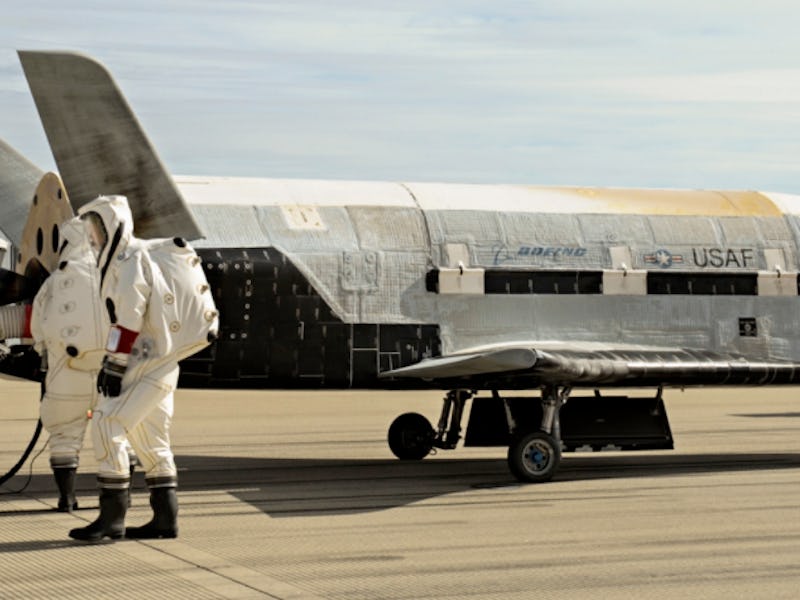Here's Why the Air Force Isn't Stoked on a Military "Space Corps"
Air Force leaders have some cold water on the plan space soldiers.

Earlier this week, Congress asked the U.S. Air Force to do something it has never done before: establish a designated force of soldiers to prepare for a war in space. Unfortunately, the Air Force’s response was “Nah, we’re good.”
On Tuesday, Congressman Mike Rogers, an Alabama Republican and chairman of the Strategic Forces subcommittee of the House Armed Services Council, along with Congressman Jim Cooper, a Tennessee Democrat, introduced a draft of legislation that would require the Air Force to set up a “Space Corps” inside its organization by January 2019.
The Space Corps would function similarly to the Marines, which are technically a branch of the Navy, but with a separate hierarchy and organization. On Wednesday, Air Force leaders threw some cold water on the plan for specialized space soldiers.
“The Pentagon is complicated enough,” Air Force Secretary Heather Wilson told reporters, according to Breaking Defense. “This will make it more complex, add more boxes to the organization chart, and cost more money. And if I had more money, I would put it into lethality, not bureaucracy….I don’t need another chief of staff and another six deputy chiefs of staff.”
Chairman of the Joint Chiefs of Staff, Marine General Joseph Dunford Jr, briefs reporters on Trump's campaign against ISIS.
The Space Corps would be led by its own Chief of Staff, who would sit with the rest of military leaders in Joint Chiefs of Staff meetings and report directly to the Secretary of the Air Force, something Wilson is clearly not trying to deal with right now. Her reaction makes a bit more sense considering the original bill’s press release, first reported by SpaceNews, effectively called out the Air Force for not having a working apparatus to defend U.S. assets in space.
We are convinced that the Department of Defense is unable to take the measures necessary to address these challenges effectively and decisively, or even recognize the nature and scale of its problems. Thus, Congress has to step in. The adversary will continue to build capabilities to hold our space assets at risk. For that reason, we must act now to fix national security space and put in place a foundation for defending space as a critical element of national security.
Wilson’s argument is that, no, dude, the Air Force is perfectly capable of defending U.S. assets and interests in space, and has been doing so for years. “We need to simplify, not make it more complicated and bureaucratic,” she said. The Air Force Chief of Staff, General David Goldfein, agreed with her.
“If you’re saying the word ‘separate’ and ‘space’ in the same sentence, you’re moving in the wrong direction,” he said. “The secretary and I are focused how do we integrate space.” Goldfein pointed out that thanks to the intricate network of satellites the military relies on for everything from maps to missile targeting, every military mission is somehow related to space. In his opinion, military space operations should remain meshed with the rest of the Air Force’s capabilities, to streamline the chain of command and efficiency of the organization.
In general, space is pretty chill and non-violent, like this friendly Swedish dude, Christer Fuglesang.
Still, Wilson’s comments didn’t go over well with Rogers and Cooper. On Thursday morning, Rogers shot back: “I had no illusions from the beginning that the Air Force was going to embrace these reforms,” he said, “but when I see arguments that we are actually going set back efforts to respond to adversaries and space threats, well, I’m outraged.” (Breaking Defense reports the original text of his statement read “pissed” instead of “outraged,” which seems way more Alabama).
It’s worth noting that whichever side wins, it’s unlikely that the Space Corps would involve legions of like, actual space soldiers. While the military may eventually train some astronauts as combat specialists (in case things get contentious on a moon colony or something), it’s more likely that the Space Corps would be a bunch of NASA-type wonks on the ground, rather than some Call of Duty freaks shooting ray guns at each other. So if you’re holding out for actual gunfights in zero gravity, you’ll probably have a while to wait.